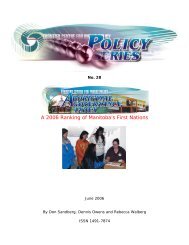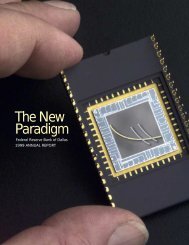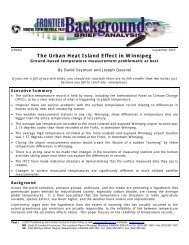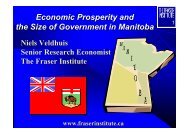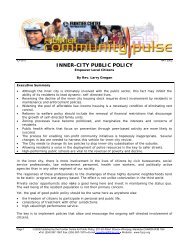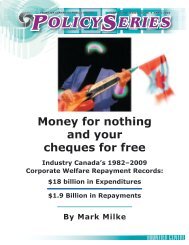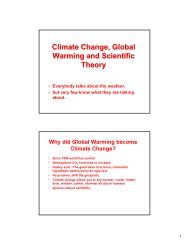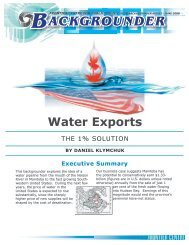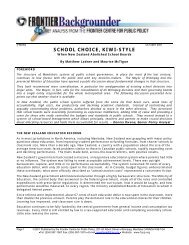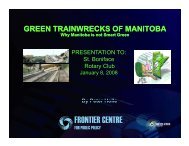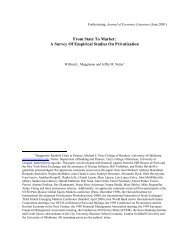The New Paradigm - Federal Reserve Bank of Dallas
Create successful ePaper yourself
Turn your PDF publications into a flip-book with our unique Google optimized e-Paper software.
2<br />
unsustainable for four years and<br />
counting. Sounds odd, doesn’t it?<br />
Our faster output growth is based<br />
primarily on faster productivity<br />
growth and secondarily on faster<br />
labor force growth.<br />
Productivity growth, or increases<br />
in output per hour worked, is the<br />
main source <strong>of</strong> rising living standards.<br />
It's nice to have more output<br />
based on more workers and more<br />
hours worked, but more output per<br />
hour worked is what raises per<br />
capita incomes and living standards.<br />
Productivity growth slowed<br />
dramatically in the early 1970s, and<br />
for two decades thereafter it grew<br />
just over 1 percent a year. With the<br />
number <strong>of</strong> hours worked also growing<br />
just over 1 percent, the potential<br />
noninflationary growth rate—the<br />
speed limit—was thought to top out<br />
around 2.5 percent.<br />
<strong>The</strong> decline in productivity<br />
growth reversed in the 1990s, especially<br />
in the second half. Productivity<br />
growth now appears to be at<br />
least 2.5 percent and rising. An<br />
increase from 1 percent to 2.5 percent<br />
is an increase <strong>of</strong> 150 percent,<br />
a huge jump with pr<strong>of</strong>ound implications<br />
if sustained. Last year was<br />
encouraging. Productivity rose over<br />
3 percent for the year and over 5<br />
percent in the second half.<br />
In addition to faster productivity<br />
growth, faster labor force growth<br />
has also boosted the economy. This<br />
was accomplished by drawing<br />
down the pool <strong>of</strong> unemployed<br />
labor, as evidenced by the decline<br />
in the unemployment rate. I mentioned<br />
in last year's Annual Report<br />
that it will be difficult to sustain<br />
recent growth rates with this shrinking<br />
labor pool, and I made two<br />
modest suggestions for alleviating<br />
the shortage: remove the penalty<br />
for Social Security recipients who<br />
work, and increase the number <strong>of</strong><br />
visas for the skilled workers our<br />
high-tech sector requires. <strong>The</strong> need<br />
is even greater a year later, making<br />
these reforms more urgent.<br />
Given today's squeaky-tight labor<br />
markets, neither <strong>of</strong> these proposals<br />
should threaten existing workers.<br />
<strong>The</strong> immigration proposal shouldn't<br />
be a threat since our colleges are not<br />
graduating enough native science<br />
and technology students to<br />
meet demand. Filling key<br />
slots with foreign<br />
workers would likely<br />
increase the demand<br />
for U.S. workers by<br />
allowing stalled projects<br />
to go forward. In addition,<br />
Americans would<br />
benefit if U.S. firms could<br />
stay put rather than relocate<br />
abroad to employ foreign<br />
workers.<br />
+<br />
<strong>The</strong> <strong>Federal</strong> <strong>Reserve</strong> <strong>Bank</strong> <strong>of</strong><br />
<strong>Dallas</strong> had a good year in 1999.<br />
We—along with our banks—<br />
squashed the Y2K bug. We provided<br />
more services with improved<br />
efficiency. <strong>The</strong> District's economy<br />
remained strong, and our banks<br />
remained pr<strong>of</strong>itable and well capitalized.<br />
A good time—as they say—<br />
was had by all.<br />
On a personal note, I, too, had a<br />
good year. Highlights included my<br />
first visit to "Austin City Limits"<br />
and to the Grand Ole Opry and the<br />
Bluebird Cafe in Nashville. At the<br />
Bluebird, the man who wrote one<br />
<strong>of</strong> my favorite songs, "Bubba<br />
Hyde," sang it for me. I made pilgrimages<br />
to Adam Smith's grave in<br />
Scotland, Buddy Holly's in Lubbock<br />
and Sam Houston's in Huntsville.<br />
1999 will be a hard year to top.<br />
Robert D. McTeer, Jr.<br />
President<br />
1999 ANNUAL REPORT <strong>Federal</strong> <strong>Reserve</strong> <strong>Bank</strong> <strong>of</strong> <strong>Dallas</strong>





